10 Best Corded Hammer Drills of 2024 – Top Picks & Reviews
-
- Last updated:

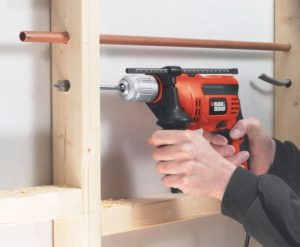
Corded hammer drills are essential if you need to drill into concrete or brick, and they often double as regular drills suitable for any DIY projects you have around the home. However, it can be quite a time-consuming task to dig through the dozens of brands available to find one suitable for your home. Many have different features and motor sizes, and it can be confusing to know what you need.
We’ve chosen 10 of the best corded hammer drills on the market today to review for you so you can see some of the differences between them. We’ll list all each one’s pros and cons and tell you a little about our experience using them. We’ve also included a short buyer’s guide where we take a close look at hammer drills to see what sets them apart from an ordinary drill, so you know what to look for while you shop.

A Quick Comparison of Our Favorites in 2024
| Rating | Image | Product | Details | |
|---|---|---|---|---|
Best Overall
 |
 |
BLACK+DECKER DR670 Hammer Drill |
|
CHECK PRICE |
Best Value
 |
 |
TACKLIFE PID01A Hammer Drill |
|
CHECK PRICE |
Premium Choice
 |
 |
DEWALT DW511 Hammer Dril |
|
CHECK PRICE |
|
|
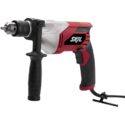 |
SKIL 6335-02 Corded Drill |
|
CHECK PRICE |
|
|
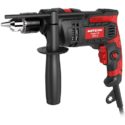 |
Meterk Hammer Drill |
|
CHECK PRICE |
The 10 Best Corded Hammer Drills
1. BLACK+DECKER DR670 Hammer Drill – Best Overall
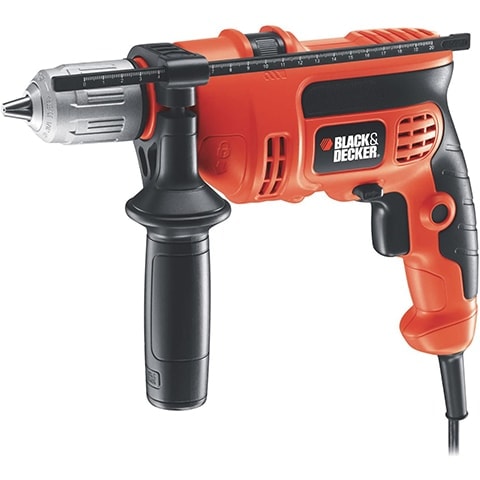
The BLACK+DECKER DR670 Hammer Drill is our pick for the best corded hammer drill overall. It has a compact design that’s easy to store and comfortable to use. The rubber-coated grip helps reduce vibrations, and it also includes a side handle for better leverage and control over the drilling angles. It’s easy to change bits with the keyless chuck, and it accepts up to ½-inch bits. It also has a depth rod for accurate drilling. Its 6-amp motor provides plenty of power and can produce up to 48,000 beats per minute (BPM) to help smash through the concrete. The drill speed is fast at 2,800 revolutions per minute (RPM) and provides up to 1,400 inch-pounds (in-lbs) of torque. It doesn’t feel flimsy but remains lightweight at 4.39 pounds.
We enjoyed using the BLACK+DECKER DR670 to drill through concrete, wood and other materials. It also works as a well as drill. The only problem we had with it was that it gets quite hot if drilling several holes into concrete.
- Includes side handle
- Compact design
- Includes depth rod
- ½-inch drill
- Keyless chuck
- 6-amp motor
- Lightweight
- It gets hot
2. TACKLIFE PID01A Hammer Drill – Best Value
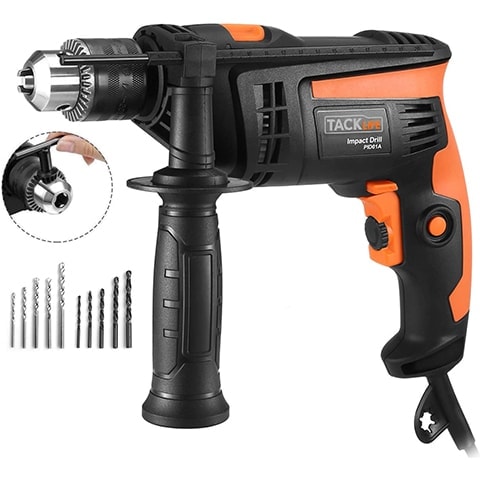
The TACKLIFE PID01A Hammer Drill is our pick as the best corded hammer drill for the money. It uses a 6-amp motor to deliver 2,800 RPM and 44,800 BPM to help smash through your concrete. It has a variable speed trigger to help get the correct RPM for any task, and it also helps when using it as a screwdriver or to begin the drilling process. It also features a reversible switch, so you can use it to remove screws. It accepts bits up to ½ inch and features a no-skid grip for better control and less fatigue, and it’s fairly lightweight at only 4.28 pounds.
While we were using the TACKLIFE PID01A, it tended to get hot and felt a little cheaper than our top pick, but it performed well, and we didn’t have any trouble drilling holes in the cement.
- 6-amp motor
- Variable speed trigger
- 360-degree rotating handle
- Reversible
- Accepts ½-inch bits
- Includes 10-piece bit set
- Gets hot
- Feels cheaply made
3. DEWALT DW511 Corded Hammer Drill – Premium Choice
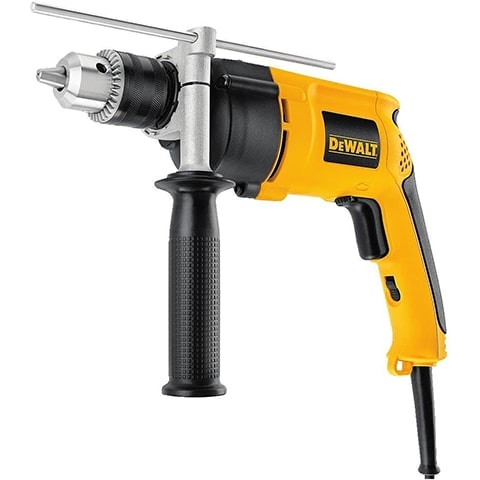
The DEWALT DW511 Hammer Drill is our premium choice corded hammer drill, and it uses a powerful 7.8-amp motor to produce up to 2,700 RPM and 46,000 BPM to make short work of even the most demanding drilling operations. It has a 2-finger variable speed trigger for more control and less fatigue, and a swiveling 360-degree side handle allows more control of the drill at different angles. It will fit any bit up to ½ inch and is lightweight at only 4.3 pounds.
We found the DEWALT DW511 Hammer Drill extremely powerful, and it did a great job on any task we used it on. The only problem we had with it was that the chuck would occasionally come loose, allowing the bit to spin or fall out.
- 8-amp
- Variable speed
- 3 pounds
- 360-degree side handle
- 2-finger trigger
- Fits ½-inch bits
- 2,700 RPM
- 46,000 BPM
- Chuck occasionally comes loose
4. SKIL 6335-02 Corded Drill

The SKIL 6335-02 Corded Drill is another powerful hammer drill that features a 7-amp motor. It can reach up to 950 RPM and fits ½-inch drill bits. You can control the drilling speed using the variable speed trigger, and the side assist handle makes it easy to balance and control the drill while working.
The SKIL 6335-02 Corded Drill worked well while we were using it, but the side handle kept slipping out of place, and it’s a little heavy at 5 pounds to use for long sessions. We also didn’t like that the manual chuck is on the drill instead of the power cord.
- 7-amp motor
- Fits ½-inch bits
- Side assist handle
- Variable speed trigger
- 950 RPM
- 5 pounds
- Side handle slips
- Chuck is attached to the cable
5. Meterk Hammer Drill
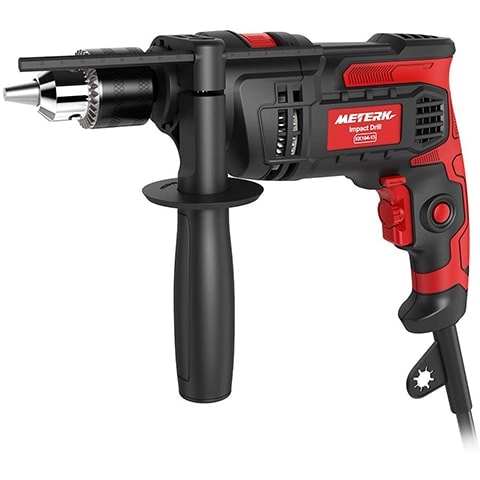
The Meterk Hammer Drill features a 7-amp motor that can deliver up to 3,000 RPM for drilling into concrete and brick. It has a variable speed trigger, and a lock-on button helps relieve strain on the fingers and reduces fatigue. It also includes a side handle for better control and a depth stop to prevent you from drilling too deep, and it accepts bits up to ½-inch bits.
We felt that the Meterk was a bit heavy at 5.25 pounds and would lead to sore hands and arms after drilling a few holes. Ours also wore out after a few months and would no longer hold the bit tight.
- 7-amp motor
- 3,000 RPM
- Variable speed trigger
- Lock-on button
- Includes side handle and depth stop
- Fits ½-inch bits
- 25 pounds
- Wears out
6. CRAFTSMAN CMED741 Corded Hammer Drill
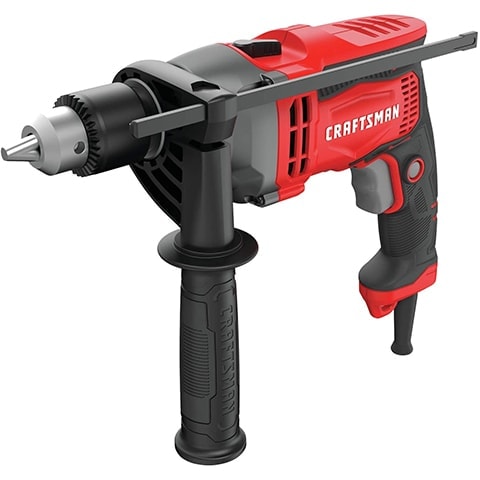
The CRAFTSMAN CMED741 Hammer Drill features a 7-amp motor that delivers up to 3,100 RPM and 52,000 BPM for smashing through most materials, and it also works as a standard drill. The lock-on button significantly reduces fatigue while you work, and the compact design helps you use the drill in tight spaces.
The CRAFTSMAN CMED741 weighs over 5 pounds, so it will get heavy quickly, especially if you use lower-grade bits that will take longer to cut through harder materials like brick. It also produces strong vibrations that will add to the fatigue. Plus, there is no variable speed, so it can be hard to start screws, and it occasionally jumps when starting to drill.
- 7-amp motor
- 3,100 RPM
- 52,700 BPM
- Lock-on button
- 19 pounds
- Strong vibrations
- Not variable speed
7. PORTER-CABLE PC700D Corded Drill

The PORTER-CABLE PC700D Corded Drill features a 7-amp motor with triple gear reduction for automatically adding more torque as needed to drill into harder materials like concrete and brick. It can reach up to 800 RPM, and it features a variable speed trigger. It has a cast metal side handle that swivels 360 degrees for better control over your drill and a cast metal gear housing for added durability.
We liked the PORTER-CABLE PC700D and found it more than powerful enough to drill into most materials. The problem we had with it was that the side handle would often slip, causing the tool to wobble, and after a few months, the chuck began to wobble as well, which made it useless to use as a standard drill.
- 7-amp motor
- 800 RPM
- Triple gear reduction
- Cast metal side handle
- Cast metal gear housing
- Variable speed
- Side handle slips
- Chuck
8. Neiko 10503A Corded Hammer Drill

The Neiko 10503A Corded Hammer Drill features a 6-amp motor that creates up to 2,800 RPM and comes with a rotating side handle for better control over the tool. A depth gauge prevents you from drilling too deep, and it fits bits up to ½-inch bits. It’s fairly lightweight at only 4.84 pounds and comes with three bits so you can get started immediately.
While we were using the Neiko 10503A, we found it a little short on power, and there wasn’t enough torque for some jobs. It also got hot quickly and started to smoke when we tried to push it. The included bits are too soft to use for any serious work, and they quickly deteriorate.
- 6-amp motor
- 2,800 RPM
- Includes side handle
- Includes depth gauge
- Comes with three bits
- 84 pounds
- Fits ½-inch bits
- Not enough torque
- Gets hot
- Flimsy included bits
9. Hitachi FDV16VB2 Hammer Drill

The Hitachi FDV16VB2 Hammer Drill is one of the lightest hammer drills on this list at only 3.5 pounds. It uses a 5-amp motor to deliver up to 2,900 RPM and can accept bits up to ½-inch wide. It has a non-slip grip handle with a variable speed trigger that includes a lock-on button to reduce fatigue in the fingers. It’s also reversible, so you can use it to extract screws, and it also comes with a handy storage case to protect it when not in use and makes it easier to transport.
The problem we had with the Hitachi FDV16VB2 was that it was constantly locking on while working because the button is poorly placed and easy to hit by accident. It was not only frustrating but potentially dangerous. The chuck also loosens when using the hammerlock setting, and it produces a burning smell when drilling harder materials like concrete or brick. The instructions are also poorly written and could confuse people with little experience using hammer drills.
- 5-amp motor
- 5 pounds
- Variable speed
- Reversible
- Non-slip grip
- Accepts ½-inch bits
- Includes case
- 2,900 RPM
- Trigger lock
- Easy to accidentally press the trigger lock
- Poor instructions
- Chuck loosens
- Burning smell
10. Milwaukee 5376-20 Hammer Drill
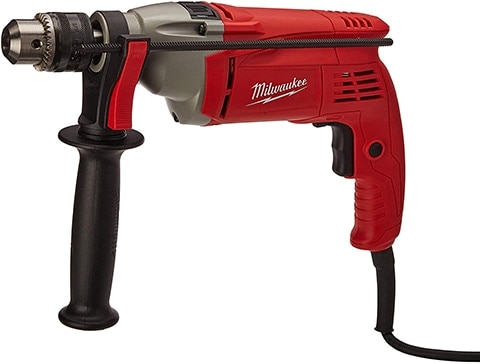
The Milwaukee 5376-20 Hammer Drill is our last model, and at 8-amps, it has the most powerful motor of the bunch. It’s capable of producing up to 2,900 RPM and 48,000 BPM for smashing through hard materials while you drill. It also includes a side handle for better control. It has an all-metal gear housing for extra durability and protection from dust, and it will accept any bit up to ½-inch. It’s weighty but not heavy at 4.9 pounds.
Unfortunately, the Milwaukee 5376-20 suffered from all of the issues we had with other hammer drills. It didn’t produce enough torque to drill into some of the harder materials like brick despite its 8-amp engine, so it would quickly get hot and produce a burning smell after one or two holes. The chuck also frequently loosens when using it in hammer mode, and the included side handle does not lock tightly enough, so it continuously slips while you are working.
- Accepts ½-inch drill bits
- All-metal gear housing
- Includes side handle
- 2,800 RPM
- 8-amps
- 48,000 BPM
- Burning smell
- Not enough torque
- Chuck loosens
- Side handle slips

Buyer’s Guide – Choosing the Best Corded Hammer Drill
Let’s look at the most important things to consider when choosing a corded hammer drill for your home.
What is a Hammer Drill?
A hammer drill is a type of drill designed to drill into hard materials like concrete and brick. An impact mechanism delivers short, quick blows to the surface to help break up the material. This mechanism reduces the time required to make the hole and helps extend the life of the bit. In most cases, you can shut off the hammering action and use the tool as an ordinary drill. You may find hammer drills labeled as a percussion drill and as an impact drill. However, the corded tools do not require an air compressor to function like many impact wrenches.
Motor Size
A big thing to be concerned with when choosing a corded hammer drill is the motor size. Most of the motors on our list measure the motor size in amps, and more amps equate to more power, which often means they are capable of producing more torque and higher RPM and BPM. All other things being equal, a stronger motor will drill faster, remain cooler, and last longer. We recommend a motor rated for at least 6 amps to drill through cement effectively, and we tried to list the amp rating for each model in our reviews when possible.
RPM and BPM
Revolutions per minute and beats per minute are important metrics to look for before purchasing your tool. You don’t need a very high RPM to drill into brick or concrete, but you may require them if you will be using the tool as a standard drill as well. The BPM is dependent on RPM because the chuck’s spinning motion compresses the air for the impact hammer. Therefore, higher RPM means more BPM and faster drilling into harder materials. If the motor size is the same, choose the hammer drill that produces more RPM and BPM.
Variable Speed Trigger
Another important feature to look for in your corded hammer drill is a variable speed trigger. A variable speed trigger will allow you to get the right speed for any job, and it also helps to avoid jumps when beginning the drilling process. Drills that begin at full speed can be difficult to control, especially if you use it to install or remove screws or require an accurately placed hole.
Lock-On
The lock-on is a feature on many triggers. It allows the drill to stay on and operate as if you were squeezing the trigger. It can be helpful during extended jobs because it helps reduce finger fatigue and hand cramps.
Weight
It may not seem important, but the hammer drill’s weight can have a big effect on its effectiveness because it determines how long you can use the tool before becoming tired. Since the hammer action can create quite a bit of vibration, only a few ounces can change a lightweight tool into a heavy one. While the maximum weight you can use effectively will vary depending on personal strength and fitness, we considered everything more than five pounds heavy in our reviews. We recommend using it as a starting point until you are sure you can manage a heavier tool.
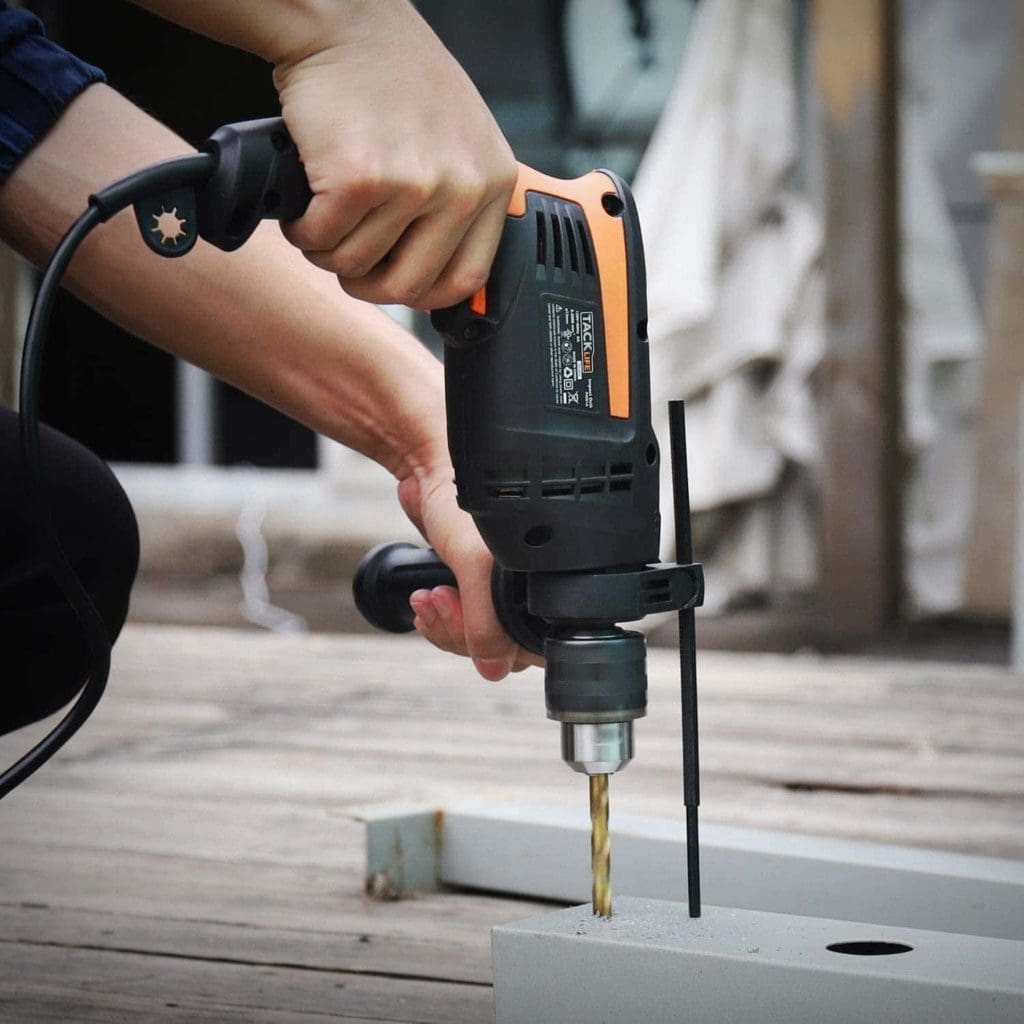
Side Handle
The corded hammer drill creates strong vibrations when in hammer mode, and the tool can become difficult to manage with one hand. It’s best to choose a model with a side handle to provide you with better control over the tool. Unfortunately, many brands offer side handles that are flimsy and ineffective. We recommend a metal handle when possible because they are much more durable than plastic handles, and we tried to point out any brands on our list that didn’t work correctly.
Chuck Size
Larger chucks accept bigger bits to create larger holes, but they also take smaller bits too. Because you will often need ½-inch holes in cement and brick, we recommend a ½-inch chuck on your corded hammer drill. All models on our list have the ½-inch chuck, but you will need to check any models while you shop.
Depth Rod
The depth rod is a simple device that attaches to your drill and prevents you from drilling too far into the surface. These are simple devices that can be plastic or metal, but we recommend metal ones when possible for durability.
Safety Equipment
Dust Mask
Due to the silica dust formed when drilling into concrete, you must wear a dust mask when working with this material to protect your health. Other materials may produce other contaminants that can harm your health, so you should wear it at all times.
Safety Glasses
Hammering into the concrete, even with the small strokes used by the hammer drill, can send debris into the air that can get lodged in the eye, so it is important to wear safety glasses with side protection while using the hammering action.

Conclusion
When choosing a corded hammer drill for your home or workshop, we highly recommend our pick for the best corded hammer drill overall. The BLACK+DECKER DR670 Hammer Drill is a powerful tool made by a household name. It performed better than most of the others on our list, some with much more powerful motors. It’s lightweight, creates up to 48,000 BPM to easily bite into a concrete or brick surface, and it’s 2,800 RPM chuck is suitable for any standard drilling tasks. Another smart choice is our pick for the best value. The TACKLIFE PID01A Hammer Drill has all of the same features as our top model, but the BPM is a little lower at 44,000, and it feels a little cheaper overall. However, it worked great for all the projects and is quite a bit less expensive.
We hope you have enjoyed reading over these reviews, and they have helped you choose a model for your home. If you think it can help others, please share this guide to the best corded hammer drills on Facebook and Twitter.
You may also be interested in: What is a Jobber Drill Bit?
Contents

